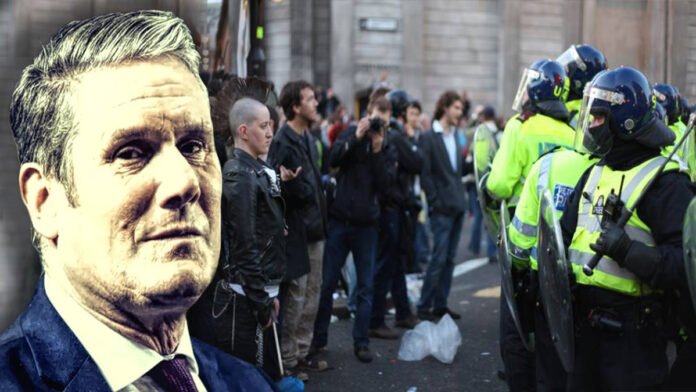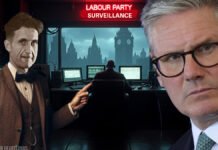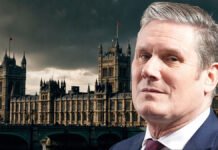From Crisis to Control: The Quiet March of Authoritarianism
The shock doctrine strikes in moments of upheaval. It comes in the first instance of change—be it natural calamity, war, political upheaval, economic turmoil, or civil unrest. In our disorientation, we become vulnerable.
When leaders exploit this chaos to force unpopular systems upon their people—political, religious, or economic—it’s a clear sign of anti-democratic intent, regardless of how they came to power.
The Tragic Tightrope: Liberty in Peril
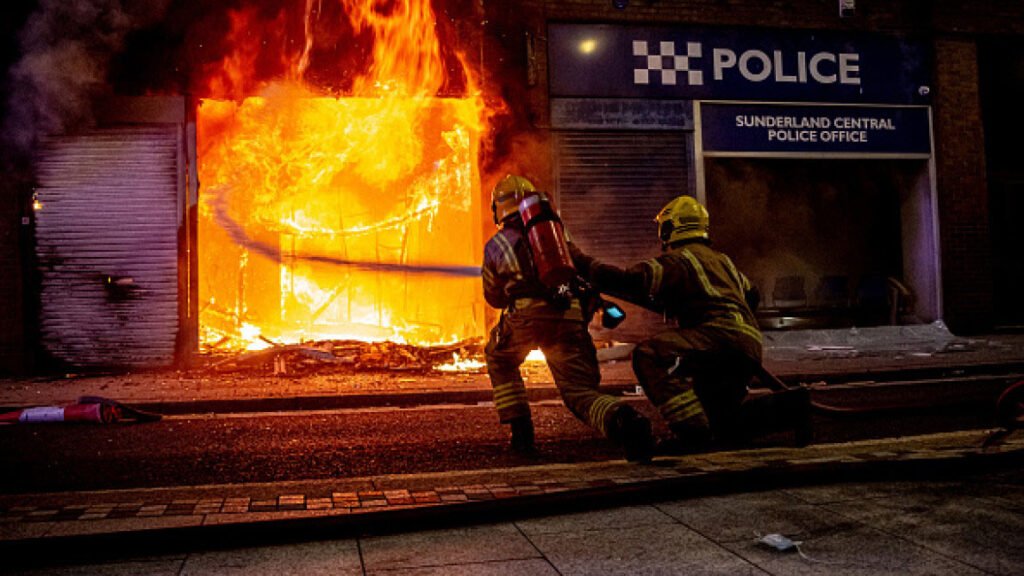
The riots scarring our nation and the cynical exploitation of the heartrending events in Southport sicken us all. The chaos on our streets is not merely a disgrace; it’s a gaping wound in our social fabric. No one of sound mind or compassionate heart desires such turmoil.
Yet, in our collective revulsion, we must not lose sight of a crucial truth: Starmer’s opportunistic push to expand the already draconian Public Order Bill is a cure far worse than the disease. This legislation, even in its current form, grants authorities powers that would make even the most ardent authoritarian goose step with pride. It’s a legal cudgel more than capable of quashing legitimate dissent along with genuine threats.
However, we cannot allow our justifiable anger and fear to blind us to the long-term consequences of further empowering the state at the expense of civil liberties. The existing laws, properly enforced, provide more than adequate tools to restore order without sacrificing the bedrock principles of a free society.
Our challenge now is to navigate this crisis without losing our moral compass. We must demand that our leaders address the root causes of societal unrest – inequality, disenfranchisement, and systemic injustice – rather than simply treating the symptoms with ever-harsher crackdowns.
Are we being protected, or are we being pacified?
The Historical Context of Crisis Exploitation
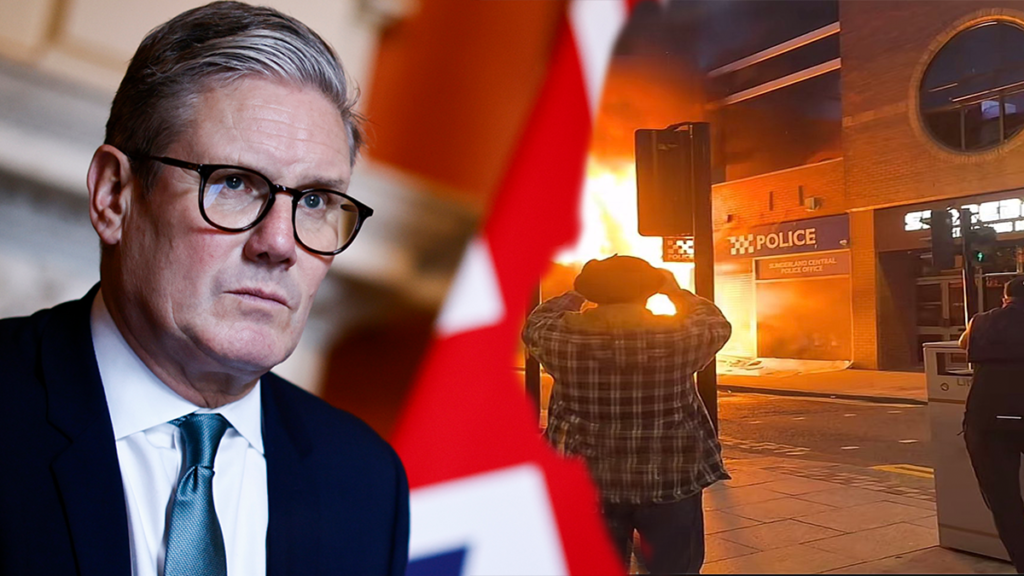
In 1982, Milton Friedman penned words that would become the unholy scripture of disaster capitalists: “Only a crisis – actual or perceived – produces real change. When that crisis occurs, the actions that are taken depend on the ideas that are lying around.” This chilling doctrine has become the modus operandi of those who seek to reshape society in their own image, consequences be damned.
Naomi Klein, that astute chronicler of our neoliberal nightmare, understood the grave implications. She warned us, “This is what Keynes had meant when he warned of the dangers of economic chaos – you never know what combination of rage, racism and revolution will be unleashed.”
This is what Keynes had meant when he warned of the dangers of economic chaos—you never know what combination of rage, racism and revolution will be unleashed.
― Naomi Klein, The Shock Doctrine: The Rise of Disaster Capitalism.
And how right she was. We now live in an era where crises are not just exploited, but engineered. The puppeteers of power create an environment ripe for chaos, then swoop in with ‘solutions’ that invariably strip away our hard-won freedoms. It’s a sinister dance of destruction and false salvation, leaving us bereft of the very liberties we once held dear.
This is not governance; it’s a confidence trick on a grand scale. They manufacture the disease, then sell us the cure – a cure that’s more poison than panacea. And with each crisis, whether genuine or contrived, we find ourselves surrendering yet another slice of our liberties to the insatiable maw of the state.
We must wake up to this cycle of manufactured – manipulation of crisis along with the controlled reaction. For if we don’t, we’ll soon find ourselves in a world where our freedoms exist only in memory, and the Orwellian nightmare becomes our waking reality. The time to resist is now, before the last vestiges of our liberty are bartered away in exchange for a security that’s as false as the crises that birthed it.
The Boomerang of Authoritarianism
Those who make peaceful revolution impossible will make violent revolution inevitable.
– John F. Kennedy
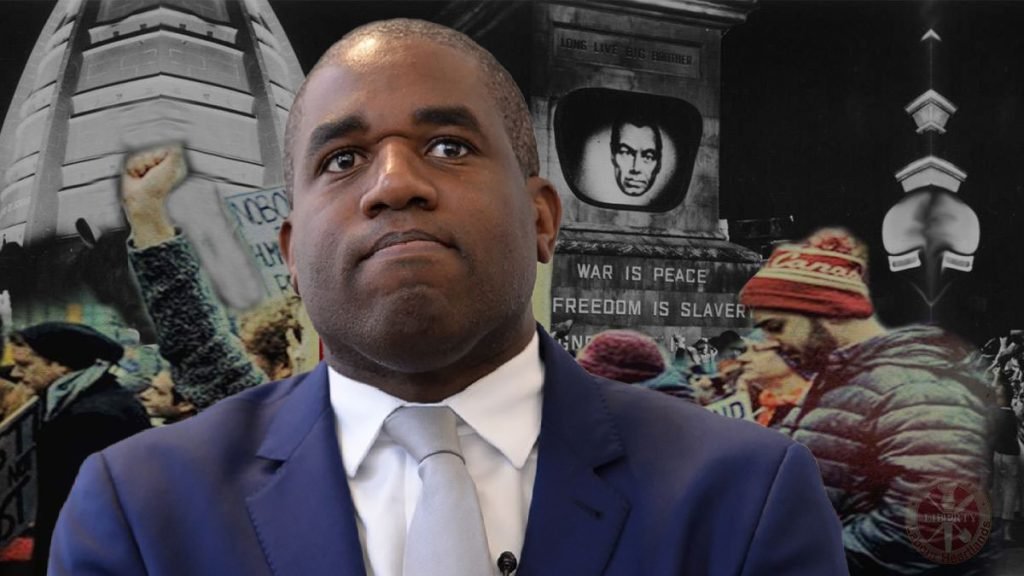
The 2011 riots emerged out of a peaceful march to demand information about the death of Mark Duggan, a black man from Tottenham, north London, who had been shot dead by the police on August 4.
There are varying accounts of what precisely triggered the outbreak of violence. But we do know the result. The emergency justice bill that followed the London riots in 2011 has given rise to a more punitive and authoritarian approach to protest policing.
Not so long ago, the right wing celebrated the Tories’ introduction of the draconian Police, Crime, Sentencing and Courts Bill. Their jubilation at the prospect of silencing Black Lives Matter and environmental protesters was palpable. In their short-sighted glee, they failed to realise a fundamental truth: laws are universal, blind to political affiliations.
This myopic view exemplifies the dangerous “divide and conquer” strategy that has long plagued our political landscape. While one side cheered the suppression of their opponents’ voices, they unwittingly applauded the forging of their own chains.
Now, we witness the relentless erosion of our civil liberties, not just through the Tories’ oppressive Public Order Bill, but with the full backing of Starmer’s Labour – a supposed opposition that acted as a mere echo chamber for authoritarian policies.
This political duopoly presents a grim future: a landscape where these suffocating laws are not only enforced but expanded. Their shared goal? A populace rendered placid, toothless and muted.
Speaking after violent disorder followed the Southport stabbing attack, the prime minister said the initiative would “pull together” intelligence and action across the country’s police forces. This would range from “the immediate challenge, which is clearly driven by far-right hatred” and “all violent disorder” that flares, regardless of motivation.
A “national capability” will be established to tackle violent disorder and rioters, Keir Starmer has announced, as he warned social media firms they had a responsibility to clamp down on misinformation.
He said the new plan was designed to show that Britain would “not allow understandable fear to curdle into division and hate in our communities and that will not permit, under any circumstances, a breakdown in law and order on our streets”. He added: “Let’s be very clear about this. It’s not protest. It’s not legitimate. It’s crime and violent disorder. An assault on the rule of law and the execution of justice.”
The “national capability” will aim to improve intelligence gathering and sharing on “extremist troublemakers” after police were surprised by the scale of disorder on Tuesday in Southport, with further unrest in London, Manchester, Hartlepool and Aldershot on Wednesday night.
The new initiative should identify agitators from all parts of the ideological spectrum, while enhancing the sharing of community tension indicators and the coordination of mutual aid, where specially riot-trained officers are rushed from one area to another, Starmer said.
The prime minister said there was “a balance to be struck” when it came to social media platforms’ efforts to tackle misinformation online, with discussion needed on whether they could face consequences if they failed to act.
“Let me also say to large social media companies and those who run them: violent disorder, clearly whipped up online, that is also a crime, it’s happening on your premises, and the law must be upheld everywhere.
“That is the single most important duty of government; service rests on security. We will take all necessary action to keep our streets safe.”
The Tragic Tightrope: Balancing Safety and Liberty
While we all recoil at the riots scarring our nation and the cynical exploitation of the heartrending events in Southport. The chaos on our streets is not merely a disgrace; it’s a betrayal of the very values we claim to hold dear. Yet, in our collective revulsion, we must not lose sight of a crucial truth: Starmer’s opportunistic push to expand the already draconian Public Order Bill is a cure far worse than the disease. This legislation, even in its current form, grants authorities powers that would make even the most ardent authoritarian salivate. It’s a legal cudgel more than capable of quashing legitimate dissent along with genuine threats.
This move bears an unsettling resemblance to strategies outlined by the Trilateral Commission, that self-appointed conclave of “private citizens” founded by David Rockefeller in 1973. Their report, “The Crisis of Democracy,” co-authored by Samuel P. Huntington, reads like a dystopian manifesto. It bemoaned what they termed “an excess of democracy,” particularly in higher education. Their concern? Too many previously apathetic voters had been educated out of their complacency. In essence, they yearned for a compliant population and, as history has shown, were prepared to advocate for forceful measures to achieve it.
As Noam Chomsky has tirelessly pointed out, this philosophy represents a fundamental threat to democratic principles. It reveals a deep-seated fear among elites of genuine popular participation in governance. The parallels between this ideology and Starmer’s current actions are impossible to ignore. As a member of the Trilateral Commission himself, one can’t help but wonder if Starmer is drawing from this very playbook. His proposed expansion of state powers, under the guise of maintaining order, aligns disturbingly well with the Commission’s vision of a more “governable” democracy – one where dissent is easily suppressed and the populace more readily controlled.
We cannot allow our justifiable anger and fear to blind us to the long-term consequences of further empowering the state at the expense of civil liberties. The existing laws, properly enforced, provide more than adequate tools to restore order without sacrificing the bedrock principles of a free society.
Our challenge now is to navigate this crisis without losing our moral compass. We must demand that our leaders address the root causes of societal unrest – inequality, disenfranchisement, and systemic injustice – rather than simply treating the symptoms with ever-harsher crackdowns.
Remember, the right to protest peacefully, to voice dissent, to hold power to account – these are not luxuries to be discarded in times of trouble. They are the very foundations of our democracy, the safety valves that prevent societal pressure from building to explosive levels.
As we stand united against violence and chaos, let us also stand firm against the erosion of our fundamental freedoms. For a society that trades liberty for a false sense of security will soon find it has neither. The path to true safety and social harmony lies not in more repressive laws, but in fostering a just, equitable, and truly democratic society for all.
In these dark times, let us be the light. Let us not surrender our liberties on the altar of fear, but instead fight for a Britain that upholds the values of justice, equality, and freedom for all. The choice is ours – will we allow the shock doctrine to strip us of our rights, or will we stand firm in defence of democracy? The answer will define not just our present, but the future of our nation.
Support Independent Journalism Today
Our unwavering dedication is to provide you with unbiased news, diverse perspectives, and insightful opinions. We're on a mission to ensure that those in positions of power are held accountable for their actions, but we can't do it alone. Labour Heartlands is primarily funded by me, Paul Knaggs, and by the generous contributions of readers like you. Your donations keep us going and help us uphold the principles of independent journalism. Join us in our quest for truth, transparency, and accountability – donate today and be a part of our mission!
Like everyone else, we're facing challenges, and we need your help to stay online and continue providing crucial journalism. Every contribution, no matter how small, goes a long way in helping us thrive. By becoming one of our donors, you become a vital part of our mission to uncover the truth and uphold the values of democracy.
While we maintain our independence from political affiliations, we stand united against corruption, injustice, and the erosion of free speech, truth, and democracy. We believe in the power of accurate information in a democracy, and we consider facts non-negotiable.
Your support, no matter the amount, can make a significant impact. Together, we can make a difference and continue our journey toward a more informed and just society.
Thank you for supporting Labour Heartlands
